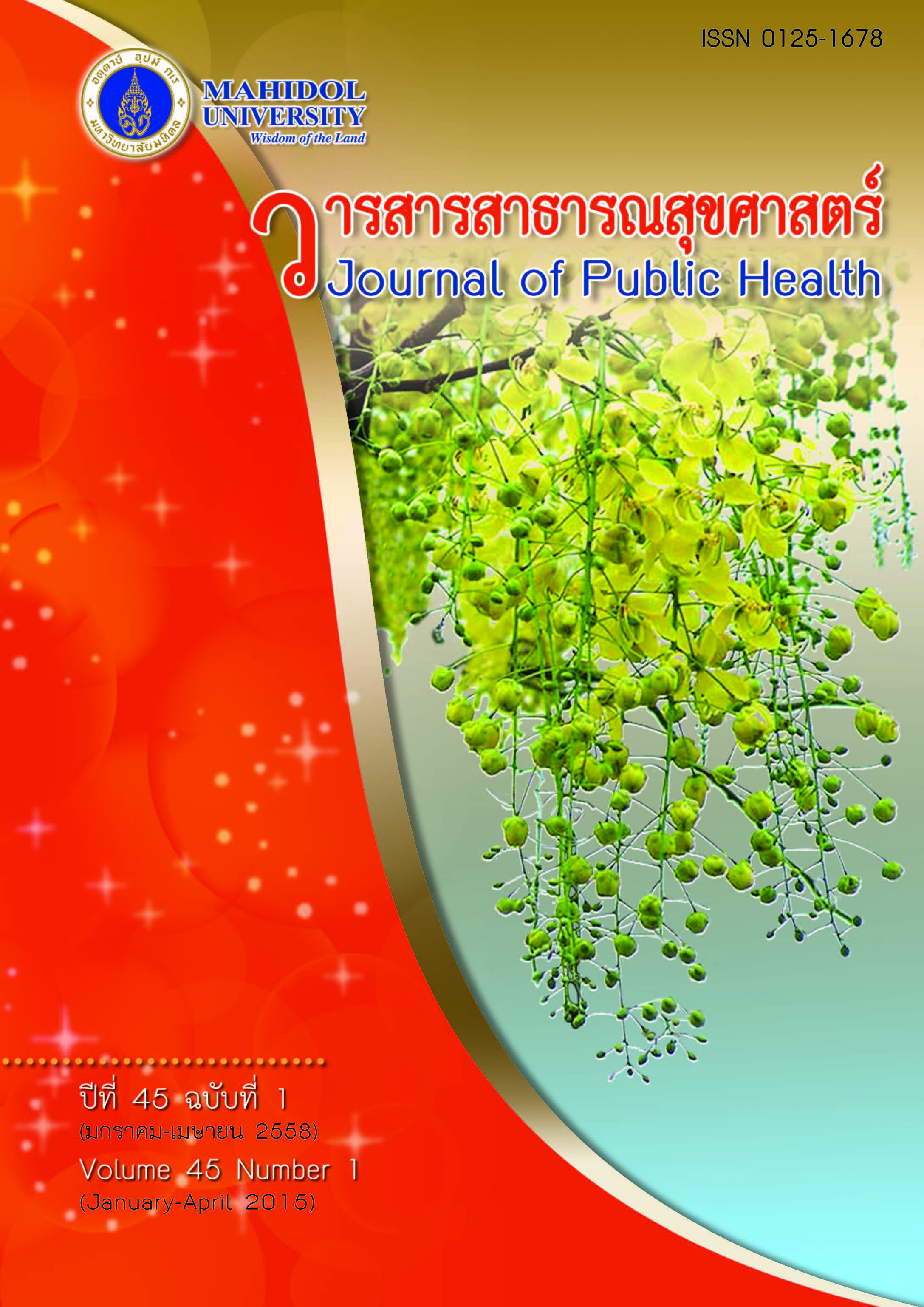พฤติกรรมส่งเสริมสุขภาพด้านโภชนาการของผู้นำศาสนาอิสลาม จังหวัดยะลา
Keywords:
พฤติกรรมส่งเสริมสุขภาพ, โภชนาการ, ผู้นำศาสนาอิสลาม, health promotion behavior, nutrition, Islamic leadersAbstract
บทคัดย่อ
การวิจัยเชิงสำรวจนี้มีวัตถุประสงค์เพื่อศึกษาพฤติกรรมส่งเสริมสุขภาพด้านโภชนาการของผู้นำศาสนาอิสลาม จังหวัดยะลา กลุ่มตัวอย่างจำนวน 312 คน ได้จากการสุ่มตัวอย่างแบบเป็นระบบโดยเริ่มจากสุ่มอำเภอ ตามด้วยสุ่มมัสยิดที่ตั้งอยู่ในอำเภอที่สุ่มได้ เครื่องมือที่ใช้ คือ แบบสอบถามที่ผ่านการตรวจสอบคุณภาพของเครื่องมือตามเกณฑ์ การวิเคราะห์ข้อมูลใช้สถิติความถี่ ร้อยละ ค่าเฉลี่ย ส่วนเบี่ยงเบนมาตรฐาน สถิติไค-สแควร์ และ สัมประสิทธิ์สหสัมพันธ์เพียร์สันผลวิจัยพบว่าผู้นำศาสนาอิสลามส่วนใหญ่มีอายุอยู่ระหว่าง 33-86 ปี มีการศึกษาอยู่ในระดับประถมศึกษา ร้อยละ 48.7 และการศึกษาด้านศาสนาอยู่ในระดับซานาวียะห์ ร้อยละ 36.5 ผู้นำศาสนาอิสลามมีระยะเวลาในการดำรงตำแหน่งอยู่ระหว่าง 1–40 ปี โดยเฉลี่ย 11.35 ปี ส่วนใหญ่ประกอบอาชีพเกษตรกรรม มีพฤติกรรมส่งเสริมสุขภาพในระดับปานกลางร้อยละ 59.0 ปัจจัยที่มีความสัมพันธ์กับพฤติกรรมส่งเสริมสุขภาพด้านโภชนาการอย่างมีนัยสำคัญทางสถิติ (p<0.001) ในกลุ่มปัจจัยนำ ได้แก่ ความรู้เรื่องโภชนาการกับการส่งเสริมสุขภาพ การรับรู้ในการให้ความสำคัญต่อการส่งเสริมสุขภาพด้านโภชนาการและทัศนคติต่อการส่งเสริมสุขภาพด้านโภชนาการ กลุ่มปัจจัยเอื้อ ได้แก่ การเข้าถึงแหล่งจำหน่ายอาหารและกิจกรรมส่งเสริมสุขภาพด้านโภชนาการในชุมชน กลุ่มปัจจัยเสริม ได้แก่ แรงสนับสนุนทางสังคมจากเจ้าหน้าที่ของหน่วยงานรัฐบาล บุคคลในครอบครัวและเพื่อนผู้นำศาสนาอิสลาม
Promotion of Nutritional Behavior by Islamic Leaders, Yala Province
ABSTRACT
This survey research aimed to study the promotion of nutritional behaviors by Islamic leaders in Yala Province. A randomized sample of 312 leaders was chosen by systematic sampling method, with districts selected first, followed by the selection of mosques from the selected districts. The instrument used was a questionnaire that had been quality checked in accordance with standard criteria. Data were represented/analyzed by frequency, percentage, arithmetic mean, standard deviation, Chi-Square test, and Pearson’s Product Moment Correlation. Results showed that participating Islamic leaders were between 36-86 years of age, 48.7 percent finished elementary school, and as to religious education, 36.5 percent finished “sanaweya” level. They had held their religious positions for 1-40 years (averaging 11.35 years), and most of them earned their living as agriculturists. Fifty-nine percent of leaders had a moderate level in promoting nutritional behaviors. The factors that were found to be significant to such nutritional promotion (p<0.001) were: predisposing factors included knowledge about nutrition and health promotion, perceived significance of nutritional promotion, and attitudes toward nutritional promotion; enabling factors included access to food distribution sources and community nutritional promoting activities; and reinforcing factors included social support from government personnel, family members and other Islamic leaders.
Downloads
Issue
Section
License
Creative Commons License CC-BY-ND


